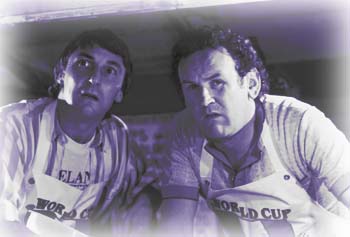![[Metroactive Movies]](/movies/gifs/movies468.gif)
![[Metroactive Movies]](/movies/gifs/movies468.gif)
[ Movies Index | Metro | Metroactive Central | Archives ]
Working Stiffs
'The Van' shines a wry light on the shift to service-sector jobs
SEAN CONNERY, interviewed on Scottish BBC, said that he thought The Problem With Movies is the gap that exists between the people who actually green-light the pictures and the people who make them. It's probably unfair, then, to blame directors and writers for the near total blackout about economic issues on the American screen.
There hasn't been much storytelling about how the U.S. economy has shifted from union jobs to service-industry gigs flipping burgers and parking cars--the kind of employment really meant when the phrase "millions of jobs created" is used by a politician. The Anglo-Irish import The Van addresses this subject with a deftness an American movie ought to borrow or steal.
It's 1989. The little, meek, newly laid-off Bimbo (Donal O'Kelly) and the large, mouthy and long-time unemployed Larry (Colm Meaney) are middle-aged friends in a low-budget suburb far outside of Dublin. Bimbo decides to invest his severance pay in one of those traveling lunch wagons usually known here as a "roach coach."
It's a half-wrecked van, covered with a thick impasto of bird droppings and discarded oil. Many Honeymooners-style adventures ensue, as the van starts its summer--this, just as Ireland gets close to the finals in the World Cup. The van is a success, but it's a success that strains the long-time friendship between the two partners.
Director Stephen Frears and writer Roddy Doyle (partners on the 1993 film The Snapper; this is the third in Doyle's trilogy of Barrytown stories) tell the tale in episodic bursts. Friction arises abruptly, and the film fails to trace confrontation between Bimbo's wife, Maggie (Ger Ran), and Larry, despite the latter's complaints of what a bitch the woman is. And Meany hams it up a bit more than necessary, even giving us a butt shot to prove that he's a star now.
The Van, while not the sitcom that the Doyle-penned The Commitments was, doesn't have the same quality as The Snapper. Still, like its predecessor, The Van appeals through dialogue: the amazing permutations of the word "fuck" to describe, among other things, a fucked-up economy and a fucked-up climate (one freezing day, Larry mutters, "Greenhouse effect, me bollocks"); and the slang ("You've got some neck," translated: "You've got a lot of nerve").
Most of all I liked how Larry and Bimbo refused to be ennobled by hard work, and the way in which Frears catches the American impression made on Ireland. At a low point, Bimbo almost decides to apply at McDonald's for a job, and we see that Budweiser in cans has arrived in Ireland too. All of these American signs made me daydream during the slow parts of the show.
If The Van had been made here, it would have been about redemption, an inspirational story which was all money-counting and no grease-scrubbing, a story told with that usual mixture of condescension and spirituality you expect when watching a movie about the Little Guy.
In fact, The Van was made for British television. Where the movies have been mute, TV has been covering the disappearing middle class--but it's only television filtered through a star's persona (Roseanne) or through animated fantasy (The Simpsons) that tries to address the subject of a just-getting-by life in the U.S.
[ Metro | Metroactive Central | Archives ]

Have You Been Served?: Colm Meaney (right) and Donal O'Kelley try to make ends meet in a downsized economy by running a lunch-meat wagon for workers.
The Van (R; 100 min.), directed by Stephen Frears, written by Roddy Doyle, photographed by Oliver Stapelton and starring Colm Meaney and Donal O'Kelley.
From the June 12-18, 1997 issue of Metro.